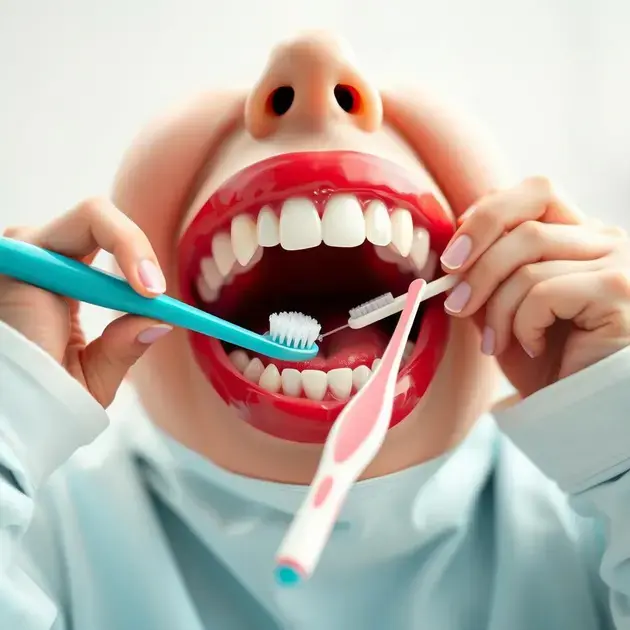Maintaining healthy habits for strong teeth and gums is vital for overall health and well-being. Recent studies show that good oral hygiene not only prevents dental issues but also helps manage other health conditions, such as heart disease and diabetes. By adopting simple yet effective daily routines, you can ensure that your dental health is always at its best.
Effective oral care involves more than just brushing and flossing. Diet plays a crucial role in dental health, with certain foods helping to protect and strengthen teeth and gums. Regular dental visits are also essential for maintaining oral health, as they allow professionals to address potential issues before they develop into serious problems.

Creating Healthy Habits for Strong Teeth and Gums
Ensuring strong teeth and gums requires the establishment of healthy habits. One essential habit is to brush your teeth at least twice a day using fluoride toothpaste. This helps remove plaque and bacteria that can lead to cavities and gum disease. Make sure to brush for at least two minutes each time, covering all surfaces of your teeth.
Another vital habit is flossing daily. Flossing helps remove food particles and plaque from between the teeth and along the gumline, where your toothbrush may not reach. Proper flossing technique involves gently sliding the floss between your teeth and curving it into a C shape to clean the sides of each tooth.
In addition to brushing and flossing, maintaining a balanced diet is crucial for strong teeth and gums. Limit sugary and acidic foods and beverages, as these can contribute to tooth decay and erosion. Instead, focus on consuming calcium-rich foods like dairy products, leafy greens, and almonds to support strong teeth.
Regular dental check-ups are also part of creating healthy habits for strong teeth and gums. Schedule biannual visits to your dentist for professional cleanings and comprehensive exams. Your dentist can detect any issues early on and provide personalized advice for maintaining oral health.
Lastly, don’t forget the importance of staying hydrated by drinking plenty of water throughout the day. Water helps wash away food particles and bacteria, keeping your mouth clean and hydrated for optimal oral health.
The Role of Diet in Maintaining Dental Health
Your diet plays a significant role in the health of your teeth and gums. To maintain dental health, incorporate nutrient-rich foods into your meals that promote strong teeth and gums. Foods high in calcium, such as milk, cheese, and yogurt, are essential for maintaining the strength of your tooth enamel.
Include foods rich in vitamin C, like citrus fruits and leafy greens, in your diet to support healthy gums. Vitamin C is essential for collagen production, which helps maintain the integrity of your gum tissue and prevent gum disease.
Limit the consumption of sugary snacks and beverages, as sugar can fuel the growth of harmful bacteria in your mouth, leading to cavities and gum inflammation. Instead, opt for crunchy fruits and vegetables like apples and carrots, which can help clean your teeth and increase saliva production.
Consider using dental health apps like “Brush DJ” or “MyTeeth” to track your daily brushing and flossing habits, set reminders for dental appointments, and receive tips for improving your oral hygiene routine. These apps can help you stay accountable and motivated to maintain a healthy diet and good oral habits.
Remember, a balanced diet not only benefits your overall health but also plays a vital role in maintaining strong teeth and gums. By making smart dietary choices and incorporating dental health apps into your routine, you can support your oral health for years to come.
The Importance of Regular Dental Visits
Scheduling regular dental visits is crucial for maintaining optimal oral health. Dentists recommend visiting their office at least twice a year for routine check-ups and cleanings. During these visits, your dentist will examine your teeth, gums, and overall oral health, looking for any signs of decay, gum disease, or other issues.
Regular dental visits also include professional cleanings to remove plaque and tartar buildup that may be difficult to reach with regular brushing and flossing. This preventive measure helps prevent cavities, gum disease, and other oral health problems down the line.
Utilize online platforms like “Zocdoc” or your dentist’s official website to schedule your dental appointments conveniently. These platforms allow you to browse available appointment slots, select a time that fits your schedule, and receive reminders about your upcoming visits to ensure you don’t miss them.
By prioritizing regular dental visits, you can address any oral health issues promptly, receive tailored advice for maintaining healthy teeth and gums, and prevent costly and extensive dental procedures in the future. Your dentist is a valuable partner in your oral health journey, so make sure to schedule and attend your dental appointments consistently.
Remember, prevention is key when it comes to dental health, and regular dental visits are a fundamental aspect of keeping your teeth and gums strong and healthy. Take the first step towards optimal oral health by scheduling your next dental visit today.

Promoting Oral Hygiene Through Simple Daily Routines
Promoting good oral hygiene through simple daily routines is crucial for maintaining a healthy smile. By establishing consistent habits, you can effectively prevent common dental issues such as cavities, gum disease, and bad breath. Here are some practical tips to help you incorporate oral hygiene into your daily routine:
1. Brushing Twice a Day
One of the most fundamental aspects of oral hygiene is brushing your teeth at least twice a day. Use a fluoride toothpaste and brush in gentle, circular motions to remove plaque and bacteria. Remember to replace your toothbrush every 3-4 months to ensure effective cleaning.
2. Flossing Daily
In addition to brushing, flossing daily is essential for reaching areas between your teeth that your toothbrush can’t access. Flossing helps remove food particles and plaque buildup, reducing the risk of cavities and gum disease. Make it a habit to floss before bedtime for optimal results.
3. Using Mouthwash
Incorporating a therapeutic mouthwash into your daily oral care routine can further enhance your oral hygiene. Mouthwash helps kill bacteria, freshen breath, and prevent gum disease. Swish the mouthwash around your mouth for 30 seconds after brushing and flossing.
4. Eating a Balanced Diet
Your diet plays a significant role in your oral health. To promote good oral hygiene, limit sugary and acidic foods that can erode tooth enamel. Instead, focus on consuming a balanced diet rich in fruits, vegetables, lean proteins, and dairy products to support strong teeth and gums.
5. Regular Dental Check-ups
Don’t overlook the importance of regular dental check-ups and professional cleanings. Your dentist can detect early signs of dental issues and provide personalized recommendations for maintaining optimal oral health. Aim to visit your dentist every six months for a comprehensive examination.
Understanding the Connection Between Oral Health and Overall Wellness
The connection between oral health and overall wellness goes beyond just maintaining a bright smile. Research has shown that poor oral health can have significant implications for your general health. Understanding this connection can motivate you to prioritize dental care as part of your overall well-being. Here’s how oral health relates to your overall wellness:
1. Oral Health and Systemic Diseases
There is growing evidence linking poor oral health to various systemic diseases such as heart disease, diabetes, and respiratory infections. Bacteria from oral infections can enter the bloodstream and contribute to inflammation and chronic health conditions. By taking care of your oral health, you can potentially reduce the risk of developing these diseases.
2. Impact on Mental Health
Good oral hygiene practices can also positively impact your mental health. Maintaining healthy teeth and gums can boost your self-esteem, confidence, and overall well-being. Conversely, untreated oral issues such as tooth decay or gum disease can lead to discomfort, pain, and psychological distress.
3. Preventing Chronic Inflammation
Gum disease is a common oral health problem that can trigger chronic inflammation in the body. Chronic inflammation is linked to various health issues, including arthritis, cancer, and Alzheimer’s disease. By preventing gum disease through proper oral hygiene, you can help reduce systemic inflammation and protect your overall health.
4. Enhancing Nutrition Absorption
Healthy teeth and gums play a crucial role in proper nutrition absorption. Digestion begins in the mouth, and oral health problems such as missing teeth or gum disease can hinder the chewing process and nutrient absorption. Maintaining good oral hygiene ensures that you can effectively process and benefit from the nutrients in your diet.
5. Improving Quality of Life
Overall, prioritizing your oral health contributes to an improved quality of life. By understanding the link between oral health and overall wellness, you can make informed decisions about your dental care routine and embrace habits that support both your oral and general well-being.
Practical Tips for Enhancing Dental Care at Home
Enhancing your dental care at home is a proactive step towards maintaining optimal oral health. By incorporating practical tips and strategies into your daily routine, you can ensure that your teeth and gums stay healthy and strong. Here are some tips for enhancing dental care at home:
1. Proper Brushing Technique
It’s not just about brushing your teeth; it’s about brushing them correctly. Use a soft-bristled toothbrush and gentle circular motions to clean all tooth surfaces effectively. Don’t forget to brush your tongue to remove bacteria and freshen your breath.
2. Invest in Quality Oral Care Products
Choose dental care products that are recommended by dentists and carry the ADA Seal of Acceptance. This seal indicates that the product has been rigorously tested for safety and effectiveness. From toothpaste to floss to mouthwash, invest in quality products for better oral hygiene.
3. Stay Hydrated
Drinking an adequate amount of water is not only essential for overall health but also for oral health. Water helps wash away food particles, neutralize acids, and maintain saliva production, which is crucial for keeping your mouth moist and inhibiting bacterial growth.
4. Limit Sugary and Acidic Foods
Sugary and acidic foods can contribute to tooth decay and erosion. Limit your consumption of candies, sodas, citrus fruits, and other harmful foods. If you do indulge, remember to brush your teeth afterward or rinse your mouth with water to minimize the impact on your dental health.
5. Practice Good Habits
Consistency is key when it comes to dental care. Make it a habit to brush and floss every day, preferably after meals. Avoid smoking or using tobacco products, as they can stain your teeth and increase the risk of oral cancer. Additionally, schedule regular dental check-ups to address any potential issues early on.
**
Conclusion
**
Incorporating simple daily routines to promote good oral hygiene is essential for preventing common dental issues and maintaining a healthy smile. By brushing twice a day with fluoride toothpaste, flossing daily, using mouthwash, eating a balanced diet, and scheduling regular dental check-ups, you can significantly improve your oral health.
Understanding the Connection Between Oral Health and Overall Wellness
Your oral health is intricately linked to your overall wellness, impacting systemic diseases, mental health, chronic inflammation, nutrition absorption, and quality of life. Taking care of your oral hygiene can potentially reduce the risk of systemic diseases, boost your mental well-being, prevent chronic inflammation, enhance nutrient absorption, and contribute to an overall improved quality of life.
Practical Tips for Enhancing Dental Care at Home
Enhancing your dental care at home involves proper brushing techniques, investing in quality oral care products, staying hydrated, limiting sugary and acidic foods, and practicing good habits consistently. By following these practical tips and strategies in your daily routine, you can ensure that your teeth and gums remain healthy, strong, and well-maintained.
